|
|
|
Sort Order |
|
|
|
Items / Page
|
|
|
|
|
|
|
| Srl | Item |
| 1 |
ID:
147232
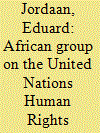

|
|
|
|
|
| Summary/Abstract |
During the early years of the United Nations Human Rights Council, formed in 2006, the African Group obstructed efforts to scrutinize and improve human rights in specific countries, notably in the cases of Darfur and the Democratic Republic of the Congo. However, in recent years the African Group has become willing to address country-specific human rights violations, particularly in Côte d'Ivoire, Libya, and Eritrea. This article documents the African Group's shift and asks why it occurred. Against the backdrop of debates about whether the liberal international order can survive a decline in American dominance, the study of the African Group's shift grants us insight into the elements that underpin liberal internationalism. Three explanations for the African Group's shift are considered: an improvement in the domestic human rights profile of African Group members, changes to the internal dynamics of the African Group, and the influence of the United States. The article concludes that American power was decisive, a finding that raises doubt about whether the liberal international order will survive a decline in American power.
|
|
|
|
|
|
|
|
|
|
|
|
|
|
|
|
| 2 |
ID:
173041
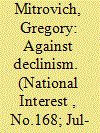

|
|
|
|
|
| Summary/Abstract |
There can be no doubting that America’s international standing has been undermined by ill-considered wars and the deadly failures of Trump’s pandemic response. However, the intrinsic strength of the United States will, like that of Britain a century ago, enable America to retain its dominance.
|
|
|
|
|
|
|
|
|
|
|
|
|
|
|
|
| 3 |
ID:
159932
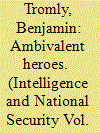

|
|
|
|
|
| Summary/Abstract |
This article uses recently declassified CIA documents to examine Soviet defectors of the 1950s, with a focus on US programs to court, receive, and utilize defectors against their homeland in espionage and psychological warfare operations. Eschewing the tendency at the time and in later scholarship to emphasize defectors’ ideological motivations, the piece argues that defectors often crossed over the Iron Curtain for reasons of self-preservation or self-advancement. Once in the West, defectors were mistrusted and badly assimilated into host societies. For these reasons, Soviet defectors rarely proved to be the committed anti-communists that American policy-makers expected them to be.
|
|
|
|
|
|
|
|
|
|
|
|
|
|
|
|
| 4 |
ID:
180324
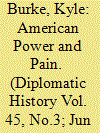

|
|
|
|
|
| Summary/Abstract |
In his 1987 surprise bestseller, The Rise and Fall of the Great Powers, Paul Kennedy offered this forecast: “The tests before the United States as it heads toward the twenty-first century are certainly daunting, perhaps especially in the economic sphere; but the nation’s resources remain considerable, if they can be properly organized, and if there is a judicious recognition of both the limitations and the opportunities of American power.”
|
|
|
|
|
|
|
|
|
|
|
|
|
|
|
|
| 5 |
ID:
046958
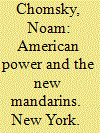

|
|
|
|
|
| Publication |
New York, The New Press, 2002.
|
| Description |
ix, 404p.pbk
|
| Standard Number |
156584775X
|
|
|
|
|
|
|
|
|
|
|
|
Copies: C:1/I:0,R:0,Q:0
Circulation
| Accession# | Call# | Current Location | Status | Policy | Location |
| 046212 | 973.923/CHO 046212 | Main | On Shelf | General | |
|
|
|
|
| 6 |
ID:
105362
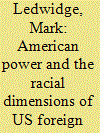

|
|
|
|
|
| Publication |
2011.
|
| Summary/Abstract |
This article consists of a critical discourse that examines the meteoric rise of Barack Obama within the context of international and domestic race relations. The article explores the impact of American racism on domestic and foreign affairs, in addition to providing contrasting viewpoints on the significance of Obama's election to the presidency. The article utilises the Obama phenomenon to assess US perceptions of the North-South divide, race, ethnicity, religion and anti-Americanism, in addition to unpacking the controversy surrounding Rev. Jeremiah Wright's characterisations of American power. The Obama campaign's post-9/11 context will be used to ascertain whether conservative efforts to associate Obama with Islam represent a conservative backlash that represents an ethnocentric re-articulation related to race, religion and the War on Terror, followed by an assessment of whether the Obama phenomenon is indicative of the perfectibility of US democracy, which would justify the exportation of American values. The article will engage in an interdisciplinary discourse grounded in political science, history and IR to provide the depth of knowledge and theoretical competency to frame the discussion in a historical and contemporary context that acknowledges Obama's relevance to domestic and international politics.
|
|
|
|
|
|
|
|
|
|
|
|
|
|
|
|
| 7 |
ID:
086440
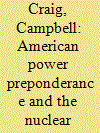

|
|
|
|
|
| Publication |
2009.
|
| Summary/Abstract |
The theory of Power Preponderance put forward by Stephen Brooks and William Wohlforth is poised to replace structural balance-of-power theory as the leading American Realist interpretation of international politics. Power Preponderance argues that would-be rivals to the US are not balancing against it because they are dissuaded from doing so by geopolitical and structural factors, rather than because they love the US or are cowed by it. This article shows why the central analytical claim of Power Preponderance would be substantially enhanced by incorporating the logic of the nuclear revolution, but that its main policy recommendation - indefinite and magnanimous American preponderance - is undermined by the spectre of nuclear war. In the nuclear age, normative solutions to the problem of anarchy invariably gravitate toward the logic of a world state.
|
|
|
|
|
|
|
|
|
|
|
|
|
|
|
|
| 8 |
ID:
130243
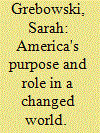

|
|
|
|
|
| Publication |
2014.
|
| Summary/Abstract |
I'll never forget my brief and ill-received show of American patriotism as a young expatriate in Beirut. It was the summer of 2010, and the city was teeming with convoys of Lebanese youth honking and waving flags to celebrate their favorite teams' victories in the World Cup. After an exciting win by the US, I joined a group of Americans in a street celebration. But cruising down the main thoroughfare of West Beirut, our procession of stars and stripes was met with disapproving looks. The image that remains with me to this day is that of an older man standing silently with his shoe in his hand. The tattered sole was pointed directly at us, an expression of disrespect in Muslim culture. We recognized the gesture's meaning only because a similar shoe had been thrown at the American president's head a year earlier.
Today's generation of young Americans, known as the millennials, has come of age at a time when America has been humbled on the world stage. Many of them have traveled extensively at a young age and experienced this diminished reputation firsthand. Their parents and grandparents believe that America has been a remarkable force for good in the world and that the country should not lose sight of its responsibility to shape events globally because of mistakes made in the last decade. But millennials seem more fixed on the limits of American power and disenchanted with ideas of American exceptionalism.
Because of these reservations, the millennial generation is often described as declinist or isolationist. I disagree. Young Americans care more than any other age group about what happens beyond our borders. Millennials tend toward multilateralism and the cautious use of force, and perhaps would be more selective in committing US resources overseas. But far from an abdication of global leadership, this prudence may prove to be the silver lining to millennials' crisis of confidence in America's role as, in President Obama's words, "not just a place on a map, but the light to the world."
|
|
|
|
|
|
|
|
|
|
|
|
|
|
|
|
| 9 |
ID:
180381
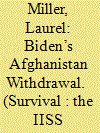

|
|
|
|
|
| Summary/Abstract |
Deciding to end the US military presence in Afghanistan is tantamount to admitting that, for the US, defeat is a tolerable outcome.
|
|
|
|
|
|
|
|
|
|
|
|
|
|
|
|
| 10 |
ID:
114556
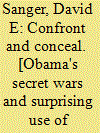

|
|
|
|
|
| Publication |
New York, Crown Publishers, 2012.
|
| Description |
xx, 476p.
|
| Standard Number |
9780307718020
|
|
|
|
|
|
|
|
|
|
|
|
Copies: C:1/I:0,R:0,Q:0
Circulation
| Accession# | Call# | Current Location | Status | Policy | Location |
| 056769 | 327.73/SAN 056769 | Main | On Shelf | General | |
|
|
|
|
| 11 |
ID:
085793
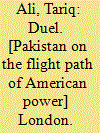

|
|
|
|
|
| Publication |
London, Simon and Schuster, 2008.
|
| Description |
ix, 288p.pbk
|
| Standard Number |
9781847373632
|
|
|
|
|
|
|
|
|
|
|
|
Copies: C:1/I:0,R:0,Q:0
Circulation
| Accession# | Call# | Current Location | Status | Policy | Location |
| 054104 | 954.9105/ALI 054104 | Main | On Shelf | General | |
|
|
|
|
| 12 |
ID:
086444
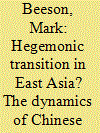

|
|
|
|
|
| Publication |
2009.
|
| Summary/Abstract |
The 'rise of China' is seen by some observers as a precursor of inevitable hegemonic competition in East Asia. At the very least, it seems likely that China's influence in East Asia will grow at the expense of the United States. Whether this will eventually amount to a form of 'hegemonic transition' is far less clear. It is, therefore, an opportune moment to consider the relative strengths and weaknesses of China and the US in East Asia. This paper suggests that the nature of hegemonic competition and transition is more uncertain and complex than some of the most influential theoretical understandings of hegemony would have us believe.
|
|
|
|
|
|
|
|
|
|
|
|
|
|
|
|
| 13 |
ID:
187385
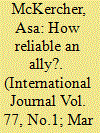

|
|
|
|
|
| Summary/Abstract |
The withdrawal of US forces from Afghanistan, and the subsequent collapse of the Western-backed Afghan government in August 2021, raised doubts in the United States and abroad about the limits and credibility of American power. For some observers, the situation seemed to parallel the fall of the South Vietnamese regime in April 1975. Given the comparisons being drawn between Saigon and Kabul, this brief paper examines a series of Canadian diplomatic reports produced in the wake of the events in South Vietnam. Addressing the question of how reliable the United States was as an ally, the conclusions drawn in these reports should give some pause to doomsaying about US security commitments. Although the contemporary situation differs from that of the mid-1970s, Canadian observers recognized that American power rested on a firm foundation.
|
|
|
|
|
|
|
|
|
|
|
|
|
|
|
|
| 14 |
ID:
086939
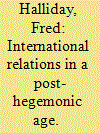

|
|
|
|
|
| Publication |
2009.
|
| Summary/Abstract |
In his valedictory lecture, concluding twenty-five years teaching at the London School of Economics and Political Science, Fred Halliday examines three aspects of the changing reality and intellectual context of International Relations. Placing a broad interpretation on the concept of the 'post-hegemonic' he looks at the changing nature of American power, the growing diversity of, and challenges to, the discipline of International Relations, and the mixed record of different conceptions of internationalism. This lecture is a reassertion of the necessity and vitality of academic reflection on International Relations, a challenge to much conventional thinking on issues of globalization, and a reassertion of the need for, and complexity of, a commitment to global values.
|
|
|
|
|
|
|
|
|
|
|
|
|
|
|
|
| 15 |
ID:
148136
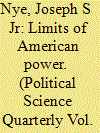

|
|
|
|
|
| Summary/Abstract |
Discusses the paradox of the United States having unparalleled military power, yet being unable to impose its will unilaterally on either its allies or its antagonists. He explains clearly why America must adopt a more cooperative engagement with the rest of the world.
|
|
|
|
|
|
|
|
|
|
|
|
|
|
|
|
| 16 |
ID:
166157
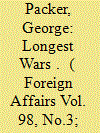

|
|
|
| 17 |
ID:
123642
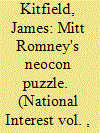

|
|
|
|
|
| Publication |
2012.
|
| Summary/Abstract |
AMERICANS WILL enter voting booths in November fixated on a sputtering domestic economy, but they will exit having elected the single most influential player on the world stage. That reflects a paradox of American power: a generally inward-looking electorate selects a leader with only scant attention to his foreign policies or international experience, and yet that person's actions undoubtedly will shape the course of global events. And into the center of that paradox walks the enigma that is Mitt Romney.
|
|
|
|
|
|
|
|
|
|
|
|
|
|
|
|
| 18 |
ID:
153035
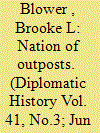

|
|
|
|
|
| Summary/Abstract |
Situating post-1945 military bases in their deeper history, this essay argues that fortified enclaves—forts, trading posts, and other “Little Americas” on foreign soil—have always played key but often-overlooked roles in U.S. nation building and empire. Analyzing outpost strategy across varied landscapes reveals new connections between overland and overseas expansion.
|
|
|
|
|
|
|
|
|
|
|
|
|
|
|
|
| 19 |
ID:
069840
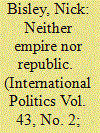

|
|
|
| 20 |
ID:
111591


|
|
|
|
|
| Publication |
2012.
|
| Summary/Abstract |
This intervention argues that Bromley's account of American power underplays some of the structural weaknesses in the US-made liberal order. These weaknesses are not principally the result of relative economic decline, but chiefly the product of a political insistence among US ruling classes in getting their own way (that is, for the immediate American interests to prevail) regardless of their longer-term socio-economic or political consequences. It is the quest for American primacy, not the pursuit of a liberal international order that is the chief driver of US external relations. Likewise it is the more volatile dynamics of class antagonism and alliances both within and outside the USA-not the rational calculation of states as Bromley suggests-that tend to determine the success or failure of American primacy. I flesh out these claims by looking successively at the ideology of post-war American Empire, the contradictions of its actual implementation and the forms of socio-economic and political instability it generates. Bromley's sanguine view of the future of liberal order, it is argued, is only persuasive with a very narrow, inter-statist conception of world order and one which therefore underestimates the social origins of geopolitical disorder.
|
|
|
|
|
|
|
|
|
|
|
|
|
|
|
|
|
|
|
|
|